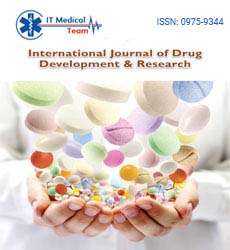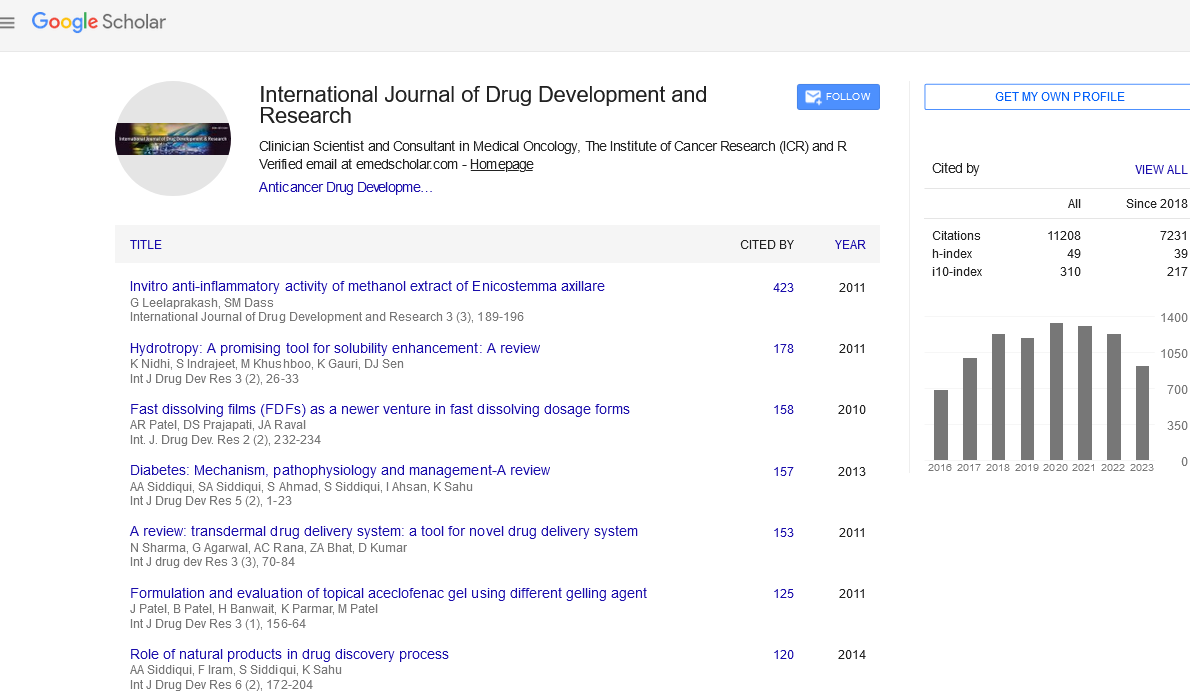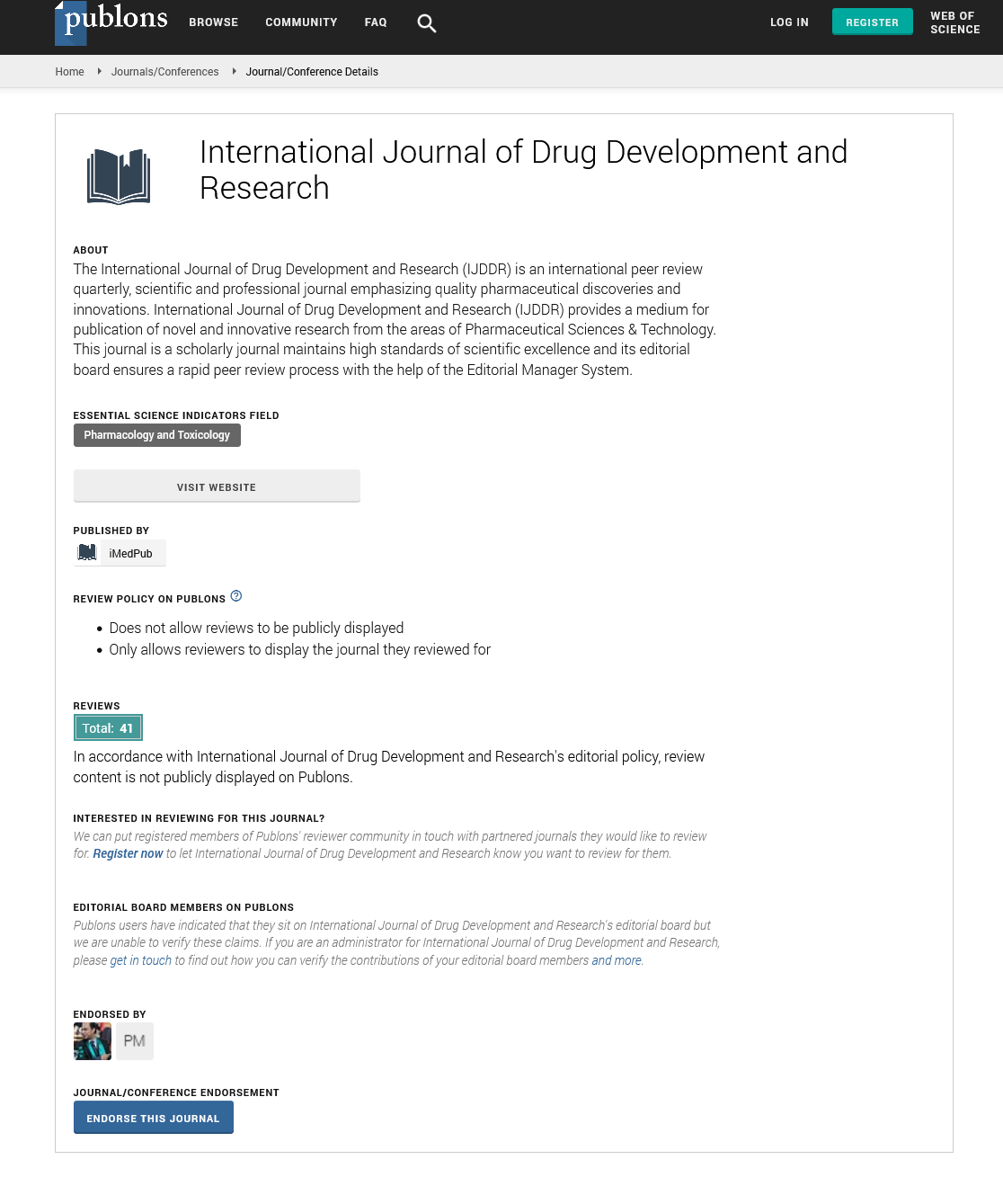Keywords
|
| Adjuvant, Rheumatoid Arthritis, Lawsonia innermis, Diclofenac |
INTRODUCTION
|
| Rheumatoid arthritis (RA) is a chronic autoimmune disease characterized by joint swelling, synovial inflammation and cartilage destruction and commonly lead to significant disability1. It affects about 1% of the population of world in a female and male ratio of 2.5:1. (R1) It caused by no of proinflammatory molecules released by macrophages including reactive oxygen species and ecosanoids such as prostaglandins, leukotrines and cytokines. The regulation of these mediators secreted by macrophages and other immune cells and modulation of arachidonic acid metabolism by inhibiting enzymes like cox and lox are the potential target for chronic inflammatory conditions.(Tripathy et al.2010) Eventhough various categories like immunosuppressants, NSAIDs, steroidal antiinflammatory drugs are being used till now, the potential side effects give a limitation for their use.(Pandey et al.2010) Now it is a growing concern allover for the development of new safe, potent, less toxic antiarthritic drug . Hence, there is a need to explore for more naturally available alternatives, so that their therapeutic values can be assessed and expanded. |
| Plants are one of the most important sources of medicines. India is known as the “Emporium of Medicinal plants” due to availability of several thousands of medicinal plants in the different bioclimatic zones anti-inflammatory diseases including rheumatoid arthritis are still one of the main health problems of the world’s population. The use of natural remedies for the treatment of inflammatory and painful conditions have a long history, starting with Ayurvedic treatment, and extending to the European and other systems of traditional medicines. Plant drugs are known to play a vital role in management of inflammatory diseases.(Hemamalini et al. 2010) |
| Lawsonia inermis Linn belonging to family Lythraceae commonly known as Henna/Mehandi in India. It is a much branched glabrous shrub or small tree, cultivated for its leaves although stem bark, roots, flowers and seeds have also been used in traditional medicine. The plant is reported to contain carbohydrates, proteins, flavonoids, tannins and phenolic compounds, alkaloids, terpenoids, quinones, coumarins, xanthones and fatty acids. The plant has been reported to have analgesic, hypoglycemic, hepatoprotective, immunostimulant, anti-inflammatory, antibacterial, antimicrobial, antifungal, antiviral, antiparasitic, antitrypanosomal, antidermatophytic, antioxidant, antifertility, tuberculostatic and anticancer properties. (Chaudhary et al. 2010) Lawsonia inermis plant have traditional claim for use in arthritic disorder. But no pharmacological work has been done on evaluation of its antiarthritic activity. So The present study was carried out to evaluate antiarthritic effect of hydroalcoholic extract of Lawsonia inermis leaves in Male Wistar rats. |
MATERIALS AND METHODS
|
| Collection and authentication of plant material |
| The leaves of Lawsonia inermis Linn. was collected from Ambajogai area of Maharashtra in the month of October and were authenticated by the Agharkar Research Institute, Pune. Authentication No. is: 09- 101. |
| Extraction of leaves |
| The 200 gm of coarsely powdered form of dried leaves of Lawsonia inermis, Linn. was subjected to exhaustive extraction in percolater apparatus using 70% aqueous ethyl alcohol. Then obtained extract were evaporated at 45°c, the semisolid mass obtained was 46 gm (% yield = 23%). The extract was stored in air tight container in refrigerator for further use. |
| The extract was converted into a suspension and used for experimental purpose. Suspension was prepared using carboxymethyl cellulose powder in distilled water. |
| Phytochemical screening of the extract |
| The extract of Lawsonia inermis Linn. was subjected to qualitative analysis for the various phytoconstituents like alkaloids, carbohydrates, glycosides, phytosterols, saponins, tannins, proteins, amino acids and flavonoids. (Khandelwal, 2006; Sakat et al., 2009). |
| Experimental animals |
| Male rats of Wistar strain weighing between 150-200 gm were used for the experiments. All the animals were obtained from Animal House of R.D’s College of Pharmacy, Bhor. All the protocols of animal experiments were approved by the Institutional Animal Ethics Committee (Approval no- RDCOP/IAEC/10/08) in accordance to the guidelines of Committee for the Purpose of Control and Supervision of Experiments on Animals (CPCSEA), ministry of Social Justice and Empowerment, Government of India, New Delhi. |
| Albino rats and mice used for this work were obtained from the Yash farm and National Toxicological Centre, Pune. The animals were housed in Poly propylene cages and maintained at 24°C ± 2°C under 12 h light/ dark cycle and were feeded ad libitum with standard pellet diet and had free access to water. The animals were given standard diet supplied by Pranav Agro Industries Ltd. Sangli. The composition of the diet are Energy 3615 (Kcal/Kg), Crude Protein 22.05%, Crude Oil 4.5%, Crude Fibre 4.10%, Ash 11.10%, Sand Silica 0.75%. |
| Acute oral toxicity study (AOT) |
| Healthy adult swiss mice (20-30 gm) were subjected to acute oral toxicity studies as per Organization for Economic Co-operation and Development (OECD) guidelines 2001 (AOT-423). Animals were observed individually after dosing at least once during the first 30 min, periodically during the first 24 h, with special attention given during the first 4 h, and daily thereafter, for a total of 14 days.The changes in skin, fur, eyes, mucous membranes, respiratory, circulatory, autonomic, central nervous system, somatomotor activity and behaviour pattern were noted (OECD guidelines, 2001). |
| Freund’s adjuvant induced arthritis |
| Freund’s adjuvant induced Arthritis model was used to access the anti-arthritic activity in albino rats. Animals were randomly divided into four groups of six animals each (n = 6). Group I served as control received 0.1ml freunds adjuvant, Group II received Diclofenac sodium (10 mg/kg p.o) served as reference standard and Group III and IV received the the hydroalcoholic extract of Lawsonia inermis (HAELI) at a dose of 200 mg/kg and 400 mg/kg respectively. Arthritis was induced by injecting 0.1 ml of freund’s adjuvant into the left hind paw. Drug treatment was started from the initial day, that is, from the day of adjuvant injection (0 day), 30 min before adjuvant injection and continued till 21st day.Paw volume and Paw thickness was measured on 0, 4th, 8th, 14th, and 21st, days by using Plethysmometer (UGO BASILE, Italy)and verneir calliper (Feldman et al., 2001) respectively. The mean changes in injected paw edema with respect to initial paw volume, were calculated on respective days .The body weight of the animals were measured by digital balance (CE,th-750) to access the course of the disease at the initial day before induction and at the end of 21st day. The rats were anaesthetized under light ether anesthesia and blood was collected by retroorbital puncture for estimation of serum parameter such as SGOT,SGPT,ALP and Total protein by using various diagnostic kits. |
Formaldehyde induced arthritis:
|
| Animals were randomly divided into five groups of six animal each (n=6). Rats were injected with 0.1 ml 2%(v/v) of formaldehyde solution in the planter surface of the left foot, on the first and third day of the test. Drug treatment was started from the initial day i.e. from the day of formaldehyde injection (0day) and continued till 10th day. The rat paw volume was recorded daily by using following Plethysmometer (UGO Basile, Italy 7140). (Bansod et al.2010). |
| STATISTICAL ANALYSIS: |
| The values were expressed as mean ± SEM (n=6). The statistical significance was assessed using student t-test or one-way analysis of variance (ANOVA) followed by Dunnet’s test and P<0.05, P<0.01, and P<0.001 were considered to be statistically significant. |
RESULT:
|
| Effect of Hydroalcoholic extract of Lawsonia Innermis in complete Freund’s adjuvant induced arthritic rats |
| Challenge with CFA (0.1ml) shows development of paw edema which reached peak edema on 21st day of injection. Diclofenac treated group shows significant inhibition of paw edema on day 4th (P<0.05), 8th (P<0.01), 14th (P<0.001) and day 21st (P<0.001). HAELI (200mg/kg) shows significant inhibition of paw edema on day 14th and day 21st with P<0.01. Also rats treated with HAELI (400mg/kg) shows significant inhibition of paw edema on day 4th (P<0.05), 8th (P<0.05), 14th (P<0.01) and day 21st (P<0.01). |
| Paw diameter was increased upto 14th day of adjuvant induction and after that it slightly decreased. Diclofenac treated group shows significant inhibition of paw diameter on day 8th (P<0.01), 14th (P<0.001) and day 21st (P<0.001). HAELI (200mg/kg) shows significant inhibition of paw diameter on day 14th and day 21st with P<0.01. Also rats treated with HAELI (400mg/kg) shows significant inhibition of paw diameter on day 14th and day 21st with P<0.01. |
| Challenge with CFA (0.1ml) shows increased in level of SGOT, SGPT, ALP and decreased in level of Total protein in control group. Diclofenac treated group shows decreased in level of SGOT (P<0.01), SGPT (P<0.01), ALP (P<0.001) and increased in level of Total protein (P<0.01). HAELI (200mg/kg) shows significant decreased in level of SGPT (P<0.05), ALP (P<0.05) and increased in level of Total protein (P<0.05). HAELI (400mg/kg) treated group shows decreased in level of SGOT (P<0.05), SGPT (P<0.05), ALP (P<0.01) and increased in level of Total protein (P<0.05). |
| Haematological findings shows that increased in level of ESR (Erythrocyte sedimentation rate) and decreased in level of HB (Haemoglobin) in control group. Rats treated with Diclofenac (10mg/kg) shows significant change in ESR and HB with P<0.01. |
| HAELI (200mg/kg) shows significant change in HB with P<0.05. HAELI (400mg/kg) shows significant change in ESR and HB (P<0.01). |
| Changes in body wt was also recorded to evaluate anti- arthritic potential of HAELI. Rats treated with Diclofenac (10mg/kg) shows significant increased in body wt (P< 0.01) when compared with control. HAELI (200mg/kg) and HAELI (400mg/kg) also shows significant changes in body wt with P<0.05. |
| Effect of Hydroalcoholic extract of Lawsonia Innermis in formaldehyde induced arthritic rats |
| Subplanter injection of formaldehyde (0.1ml) shows increased in paw edema which reaches peak on day 6th and after that it slightly decreased on day 10th. Diclofenac (10mg/kg) treated rat shows significant changes in paw edema on the day 3rd (P<0.05), day 6th (P<0.001) and day 10th (P<0.001).HAELI (200mg/kg) shows significant changes in paw edema on the day 6th (P<0.05) and day 10th (P<0.01). Also rats treated with HAELI (400mg/kg) shows significant changes in paw edema on the day 6th (P<0.01) and day 10th (P<0.001) |
DISCUSSION:
|
| The Freund’s complete adjuvant (FCA) induced arthritis model in rats is the most common model . This preclinical model predicted the activities of a number of compounds that are currently used in the treatment of rheumatoid arthritis are being tested in clinical trials.There are 4 phases of arthritis on the basis of biochemical markers of arthritis (1) Day 1-4 with acute local inflammation and systemic effects (liver), (2) Days 7-12 with remission of acute inflammation and periarthritis, (3) Days 12-28 with chronic inflammation, periarthritis and osteogenic activity,(4) Day 35 onwards (indefinitely) with permanent articular deformity and minimal (burnout ) inflammation. A general increase in 5- HT synthesis within the whole central nervous system during the acute phase of the disease (2-3 weeks postinoculation) with a specific, further enhancement restricted to the spinal cord during the post acute phase (4-6 weeks postinoculation). (Chitme et al.2009) |
| The present study was carried out to see the efficiency of Indian herbal source against a chronic inflammatory disease i.e. arthritis. In the present study, rats were selected to induce arthritis because they develop a chronic swelling in multiple joints due to accumulation of inflammatory cells, erosion of joint cartilage and bone destruction. It has close similarities to human rheumatoid diseases (Harris et al.1990). The determination of paw swelling is apparently simple, sensitive and quick procedure for evaluating the degree of inflammation and the therapeutic effects of drugs. The freund’s adjuvant model is chosen as it develop chronic swelling in multiple joints with influence of inflammatory cells with erosion of joint cartilage and bone destruction. Chronic inflammation involves the release of number of mediators like cytokines (IL-1B and TNF-alpha), GM-CSF, interferon’s and PGDF. These mediators are responsible for the pain, destruction of bone and cartilage that can lead to severe disability.(Lam et al. 2004). |
| However standard drug and Hydroalcoholic extract of Lawsonia innermis significantly suppressed the swelling of the paws and also decreases the paw volume in both acute and chronic phase which may be due to the suppression of inflammatory mediator released due to induction of freund’s adjuvant. Though the actual mechanism of suppressing inflammation is not known but it can be correlated with the presence of alkaloids and flavonoids in suppressing the inflammation and antioxidant activity. As the incidence and severity of arthritis increased, the changes in the body weights of the rats also occurred during the course of the experimental period. Earlier findings suggest that absorption of 14C- glucose and 14C-leucine in rat’s intestine was reduced in the case of inflamed rats (Tripathy et al. 2010) but on the treatment with antiinflammatory drugs, the decrease in absorption was nullified and it shows that the anti-inflammatory drugs correct the decreased/deranged absorption capacity of intestine during inflammation. |
| The increased body weight during treatment of standard drug, Hydroalcoholic extracts may be due to the restoration of absorption capacity of intestine. The extract also shows significant effect on various blood and serum parameters. |
| Formaldehyde induced arthritis is one of most commonly used acute model for assesing anti-arthritic potential of plant extract. The development of edema in the paw of the rat after injection of formaldehyde (0.1ml,2% w/v) is due to the release of histamine, serotonin and the prostaglandin like substances at the site of injection (Bansod et al.2010). Inhibition of paw edema in formaldehyde induced arthritis may be due to the anti-inflammatory potential of HAELI. |
CONCLUSION
|
| On the basis of the results obtained in this study we conclude, and propose that possibly, the potent anti-arthritic effect of Lawsonia Innermis extract may be through maintenance of synovial membrane, thereby inhibiting cytokines and leukotriene infiltration inhibition as evidenced in paw edema volume. In turn, protecting synovial membrane and improving health status through antiinflammatory properties of HAELI. |
| Improvement in health parameters consider in this study including HB, ESR, and body weight indicating its beneficial effects while recovery from arthritis. From the results observed from the current investigation, it is concluded that the Hydroalcoholic extract of Lawsonia Innermis possesses potentially useful antiarthritic activity since it give a positive result in controlling inflammation in adjuvant induced arthritic model in rats. |
Conflict of Interest
|
| NIL |
Source of Support
|
| NONE |
Tables at a glance
|
 |
 |
 |
| Table 1 |
Table 2 |
Table 3 |
 |
 |
 |
| Table 4 |
Table 5 |
Table 6 |
|
| |
Figures at a glance
|
|
|
| |






